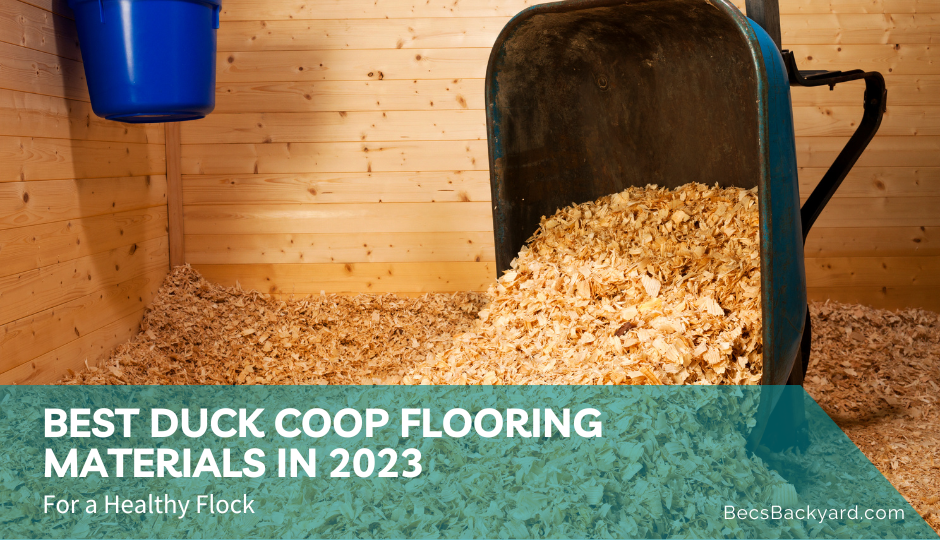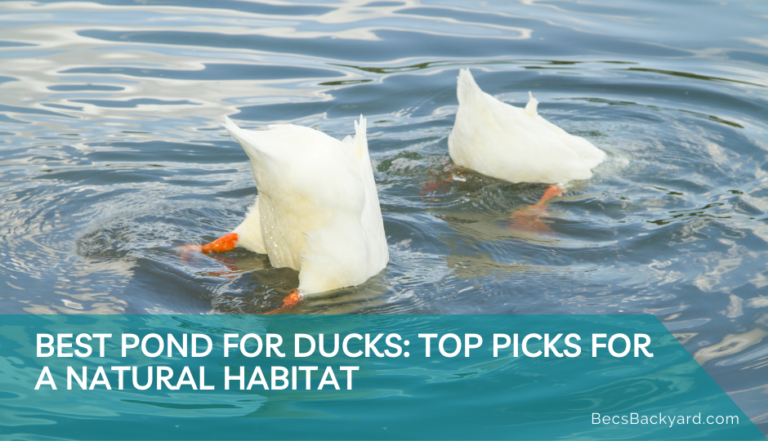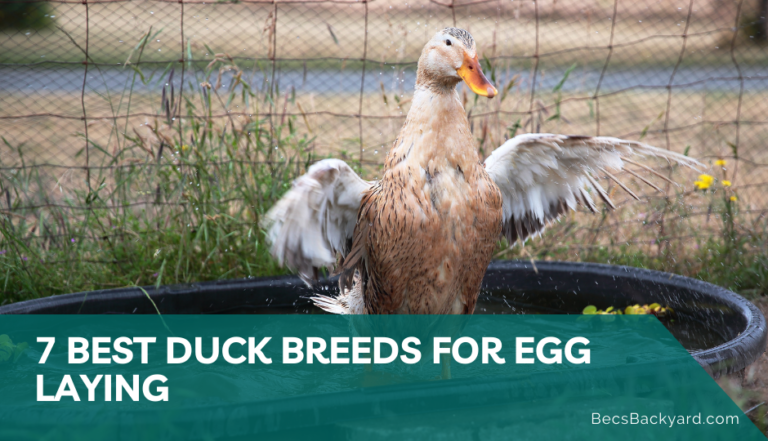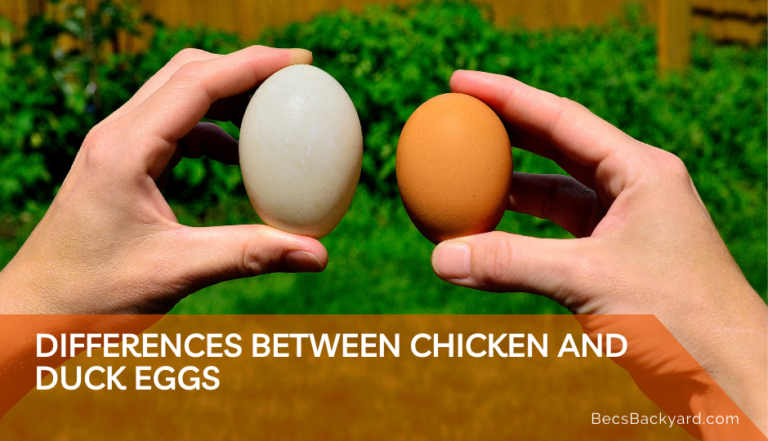Best Duck Coop Flooring Materials in 2023: For a Healthy Flock

Creating an ideal living environment for ducks involves ensuring their comfort and safety. A key aspect of establishing a secure and pleasant duck coop lies in selecting appropriate flooring materials. The chosen material significantly impacts the well-being and hygiene of the ducks, while also facilitating ease in cleaning.
This article aims to explore the best duck coop flooring materials, equipping you with the necessary knowledge for making an informed decision. It will delve into the significance of selecting suitable flooring, factors to consider during the decision-making process, and the advantages and disadvantages of various choices.

Importance of Choosing the Right Flooring Material for Duck Coops
Choosing the right flooring material for your duck coop is crucial for the overall health and well-being of your ducks. Ducks spend a significant amount of time on their feet, so it is important to provide them with a comfortable and safe surface to walk and rest on.
One of the main considerations when selecting a flooring material is durability. Ducks can be quite messy, and their droppings can be corrosive and damaging to certain materials. Therefore, it is important to choose a flooring material that can withstand the constant exposure to moisture and waste.
Another important factor to consider is ease of cleaning. Duck coops need to be cleaned regularly to maintain a hygienic environment for the ducks. The flooring material should be easy to clean and disinfect to prevent the buildup of bacteria and parasites.
Additionally, the flooring material should provide good traction for the ducks. Ducks have webbed feet, which can be slippery on certain surfaces. A non-slip flooring material, such as rubber mats or textured concrete, can help prevent injuries and ensure that the ducks can walk and move around comfortably.
Furthermore, the flooring material should be comfortable for the ducks to rest on. Ducks spend a significant amount of time sitting and resting, so it is important to provide them with a soft and cushioned surface. Materials such as straw or wood shavings can provide a comfortable bedding area for the ducks.
Overall, choosing the right flooring material for your duck coop is essential for the health and well-being of your ducks. It should be durable, easy to clean, provide good traction, and offer a comfortable resting area. By considering these factors and weighing the pros and cons of different materials, you can make an informed decision and create a safe and comfortable environment for your ducks.
Factors to Consider When Selecting Duck Coop Flooring Material
When selecting the flooring material for your duck coop, there are several important factors to consider. These factors will help ensure that you choose a material that is not only suitable for your ducks but also meets your specific needs and preferences.
Durability:
Ducks can be quite messy, and their coop flooring will inevitably be exposed to water, droppings, and other debris. Therefore, it is crucial to choose a flooring material that is durable and can withstand these conditions without deteriorating or becoming damaged easily. Materials such as concrete or rubber mats are known for their durability and can withstand the wear and tear caused by ducks.
Comfort:
Ducks spend a significant amount of time on their feet, so it is essential to provide them with a comfortable flooring surface. Materials like straw or wood shavings can provide a soft and cushioned surface for the ducks to walk and rest on. However, it is important to regularly replace and clean these materials to prevent the buildup of moisture and bacteria.
Safety:
The flooring material should also prioritize the safety of your ducks. It should be slip-resistant to prevent any accidents or injuries. Rubber mats are known for their non-slip properties, making them a safe option for duck coops. Additionally, the flooring material should not have any sharp edges or splinters that could harm the ducks’ feet.
Ease of Cleaning:
Ducks produce a significant amount of waste, so it is crucial to choose a flooring material that is easy to clean and maintain. Concrete flooring is relatively easy to clean as it can be hosed down and scrubbed. Rubber mats can also be easily cleaned by hosing them off or wiping them down. On the other hand, materials like straw or wood shavings require regular replacement and cleaning to prevent the buildup of waste and bacteria.
By considering these factors, you can make an informed decision when selecting the best flooring material for your duck coop. Remember to prioritize durability, comfort, safety, and ease of cleaning to create a suitable and hygienic environment for your ducks.
Straw
Straw is a commonly used flooring material for duck coops due to its affordability and availability. It provides a soft and comfortable surface for ducks to walk and rest on. However, there are both pros and cons to using straw as a flooring material for duck coops.
Pros
- One of the main advantages of using straw is its insulation properties. Straw can help to keep the coop warm during colder months, providing a cozy environment for the ducks.
- It also absorbs moisture well, which is important for maintaining a dry and clean coop.
- Straw is easy to replace and dispose of, making it a convenient option for coop owners.
Cons
- One of the main concerns is its potential for harboring bacteria and parasites. Straw can become damp and provide a breeding ground for harmful organisms, which can lead to health issues for the ducks. Regular cleaning and maintenance are necessary to prevent these problems.
- Another disadvantage of using straw is its lack of durability. Ducks are known to be messy animals, and their constant movement and scratching can quickly wear down the straw flooring. This means that straw may need to be replaced more frequently compared to other flooring materials.
Straw is a great option for the duck owner who is going to be committed to regular cleaning out of the coop, this will ensure that any soiled straw material is removed before harmful bacteria buildup can occur.
Rubber Mats
Rubber mats are a popular choice for duck coop flooring due to their durability and ease of cleaning. Here are some pros and cons to consider when using rubber mats as flooring material for your duck coop.
Pros
- Durability: Rubber mats are known for their longevity and ability to withstand heavy use. Ducks can be quite active and may scratch or peck at the flooring, but rubber mats are resistant to such damage, making them a durable option.
- Easy to clean: Rubber mats are non-porous, which means they do not absorb liquids or odors. This makes cleaning a breeze as you can simply hose down or wipe off any messes. Additionally, rubber mats can be easily removed for a more thorough cleaning if needed.
- Comfortable for ducks: Rubber mats provide a soft and cushioned surface for ducks to walk and rest on. This can be especially beneficial for ducks with foot or leg issues, as the mats offer support and reduce the risk of injuries.
- Slip-resistant: Rubber mats have a textured surface that provides traction, reducing the chances of ducks slipping and injuring themselves. This is particularly important in wet or muddy conditions, as ducks can easily lose their footing.
- Insulation: Rubber mats provide insulation against cold and dampness. They help to keep the coop warm during colder months and prevent moisture from seeping into the flooring, which can lead to bacterial growth and health issues for the ducks.
Cons
- Initial cost: Rubber mats can be more expensive compared to other flooring materials such as straw or wood shavings. However, their durability and long lifespan can offset the initial investment in the long run.
- Heat retention: Rubber mats have the tendency to retain heat, which can be a concern in hot climates. It is important to ensure proper ventilation and provide shade to prevent overheating for the ducks.
- Limited natural behavior: Ducks naturally forage and peck at the ground, which may be limited with rubber mats. While they can still engage in these behaviors to some extent, it may not be as satisfying or natural as on a softer or more natural flooring material.
- Odor Retention: Rubber mats may retain odors if not cleaned regularly. It is important to maintain proper hygiene and regularly clean the mats to prevent any unpleasant smells from developing.
Rubber mats are a durable and easy-to-clean flooring option for duck coops, they provide comfort, insulation, and a non-slip surface for ducks. However, they may be more expensive and require regular cleaning to prevent odor retention, it also does not allow for the natural foraging of ducks where they can investigate into soil for bugs and critters..
Concrete
Concrete is a popular choice for duck coop flooring material due to its durability and ease of cleaning. Here are some pros and cons to consider when using concrete as the flooring material for your duck coop.
Pros
- Durability: Concrete is a highly durable material that can withstand the weight and movement of ducks without getting damaged. It is resistant to scratches, cracks, and other forms of wear and tear, making it a long-lasting option for your duck coop.
- Easy to Clean: Concrete flooring is relatively easy to clean and maintain. It can be swept or hosed down to remove dirt, debris, and waste. Additionally, concrete can be disinfected easily, which is important for maintaining a hygienic environment for your ducks.
- Predators Protection: Concrete flooring provides a solid barrier against predators such as rats, snakes, and other small animals that may try to dig their way into the coop. This added protection can help keep your ducks safe and secure.
Cons
- Lack of Comfort: Concrete is a hard and unforgiving material, which may not provide the same level of comfort as softer flooring options like straw or wood shavings. Ducks spend a significant amount of time on their feet, so it is important to consider their comfort when choosing a flooring material.
- Cold Surface: Concrete can become cold, especially during colder months or in colder climates. This can be uncomfortable for ducks, as they prefer warmer surfaces. Providing additional bedding or insulation can help mitigate this issue.
- Slippery Surface: Concrete can be slippery, especially when wet. This can increase the risk of ducks slipping and injuring themselves. Adding a non-slip coating or providing additional traction, such as rubber mats or straw, can help improve traction and reduce the risk of accidents.
- Limited natural behavior: Ducks naturally forage and peck at the ground, which may be limited with rubber mats. While they can still engage in these behaviors to some extent, it may not be as satisfying or natural as on a softer or more natural flooring material.
While concrete is a durable and easy-to-clean flooring material for duck coops it may lack comfort and can be cold and slippery. Concrete also does not allow for the natural foraging of ducks where they can investigate into soil for bugs and critters.
Sand
Sand is another popular choice for duck coop flooring due to its excellent drainage properties. It is soft and comfortable for the ducks to walk on, and it is also easy to clean. However, it is important to regularly replace the sand as it can become soiled and compacted over time.

Bec’s has chosen this option for the following reasons:
- Cost – builders sand is very affordable
- Drainage – fluids from the ducks will drain through the sand
- Clean up – solids can be easily collected with a slotted scoop
- Durability – being an inert material it does not break down or degrade
- Compaction can be addressed with tilling
Pros
- Drainage: Sand has excellent drainage properties, allowing water to quickly pass through and prevent the coop from becoming wet and muddy. This can help maintain a cleaner and healthier environment for the ducks.
- Comfort: Sand provides a soft and comfortable surface for ducks to walk and rest on. It mimics the natural ground conditions they would encounter in their natural habitats, offering them a more comfortable and natural experience.
- Easy to clean: Sand is relatively easy to clean compared to other materials. Solid waste can be easily scooped or raked up, and any soiled or damp sand can be removed and replaced periodically. This helps maintain better hygiene in the coop.
- Dust reduction: Sand tends to produce less dust compared to materials like wood shavings or straw. This can be beneficial for the respiratory health of both ducks and humans, especially if someone is sensitive to dust.
Cons
- Prone to compaction: Over time, sand can become compacted, especially in high-traffic areas. This may require occasional raking or stirring to keep the surface loose and prevent it from hardening. Compacted sand can be uncomfortable for the ducks to walk on and may hinder its drainage properties.
- Can retain moisture: While sand drains well, it can also retain moisture if the coop has a high humidity level or if water spills frequently. This can create damp conditions, which may not be ideal for the ducks and could potentially lead to health issues or promote the growth of bacteria or fungi.
- Requires frequent replacement: Sand may need to be replaced periodically, as it can become soiled with waste or lose its drainage properties due to compaction or excessive moisture. Regular maintenance and replacement can be time-consuming and may incur additional costs.
- Freezing in cold climates: In regions with freezing temperatures, sand can freeze and become hard, making it uncomfortable for the ducks to walk on. In such cases, additional insulation or heating methods may be necessary to keep the coop floor comfortable for the ducks.
Other Potential Duck Coop Flooring Materials to Consider
When it comes to choosing the best flooring material for your duck coop, there are several options to consider apart from the commonly used materials like straw, wood shavings, rubber mats, and concrete. Here are some other potential flooring materials that you may want to explore:
Gravel:
Gravel can be a suitable option for duck coop flooring as it provides good drainage and helps to prevent the accumulation of water and mud. It is also relatively easy to clean and maintain. However, it is important to ensure that the gravel is not too large or sharp, as this can cause discomfort or injury to the ducks’ feet.
Concrete with a layer of bedding:
Some duck owners prefer to have a concrete floor in their coop for easy cleaning and durability. However, concrete can be hard on the ducks’ feet, so it is recommended to provide a layer of bedding material such as straw or wood shavings on top of the concrete to provide cushioning and insulation.
Pavers:
Pavers are a durable and long-lasting option for duck coop flooring. They provide a solid surface that is easy to clean and maintain. Pavers also offer good traction for ducks, reducing the risk of slips and falls. However, they can be more expensive compared to other materials.
Grass or sod:
If you have a large outdoor area for your ducks, you may consider using grass or sod as the flooring material. This natural option provides a comfortable and familiar surface for ducks to walk on. However, it requires regular maintenance and depending on the size of your flock they may decimate the grass eating it into non-existence leaving you with dirt that quickly turns into mud. This is however a great option for outdoor foraging areas or runs.
When considering these alternative flooring materials, it is important to assess your specific needs and the environment in which your ducks will be housed. Factors such as climate, space availability, and ease of maintenance should be taken into account. Additionally, it is crucial to regularly monitor the condition of the flooring and make any necessary adjustments or replacements to ensure the health and well-being of your ducks.
Conclusion: Choosing the Best Duck Coop Flooring Material for Your Needs
Selecting the right flooring material for your duck coop is crucial for creating a safe and comfortable environment for your ducks. Consider factors such as durability, ease of cleaning, and the overall well-being of your ducks when making your decision.
Straw is a popular option for duck coop flooring as it provides a soft and comfortable surface for the ducks to walk on. However, it can be difficult to clean and may require frequent replacement. Wood shavings are another option that offers a comfortable surface and is relatively easy to clean. However, they may not be as durable as other materials and can become slippery when wet.
Rubber mats are a practical choice for duck coop flooring as they are durable, easy to clean, and provide good traction for the ducks. They can also help to insulate the coop and provide a cushioned surface for the ducks to rest on. However, they may be more expensive than other options.
Concrete is a long-lasting and easy-to-clean option for duck coop flooring. It is durable and resistant to moisture, making it a practical choice for keeping the coop clean and hygienic. However, it can be hard on the ducks’ feet and may require additional bedding or padding for comfort.
Other potential flooring materials to consider include gravel, sand, or a combination of materials. These options can provide good drainage and are easy to clean. However, they may not offer the same level of comfort as softer materials.
When maintaining and cleaning your duck coop flooring, it is important to regularly remove any waste or soiled bedding to prevent odors and the buildup of bacteria. Provide fresh bedding regularly and ensure that the flooring is kept dry to promote the health and well-being of your ducks.
So, when choosing the best duck coop flooring material requires careful consideration of factors such as durability, ease of cleaning, and the comfort of your ducks. Evaluate the pros and cons of different materials and select the option that best suits your needs and the needs of your ducks. With the right flooring material, you can create a safe and comfortable environment for your ducks to thrive.”




